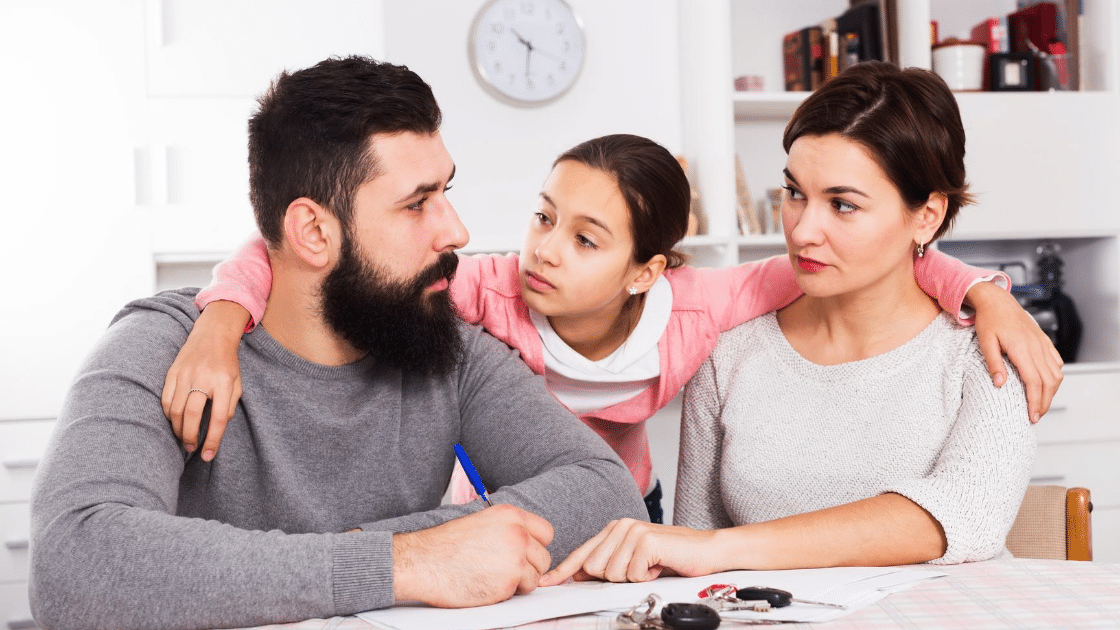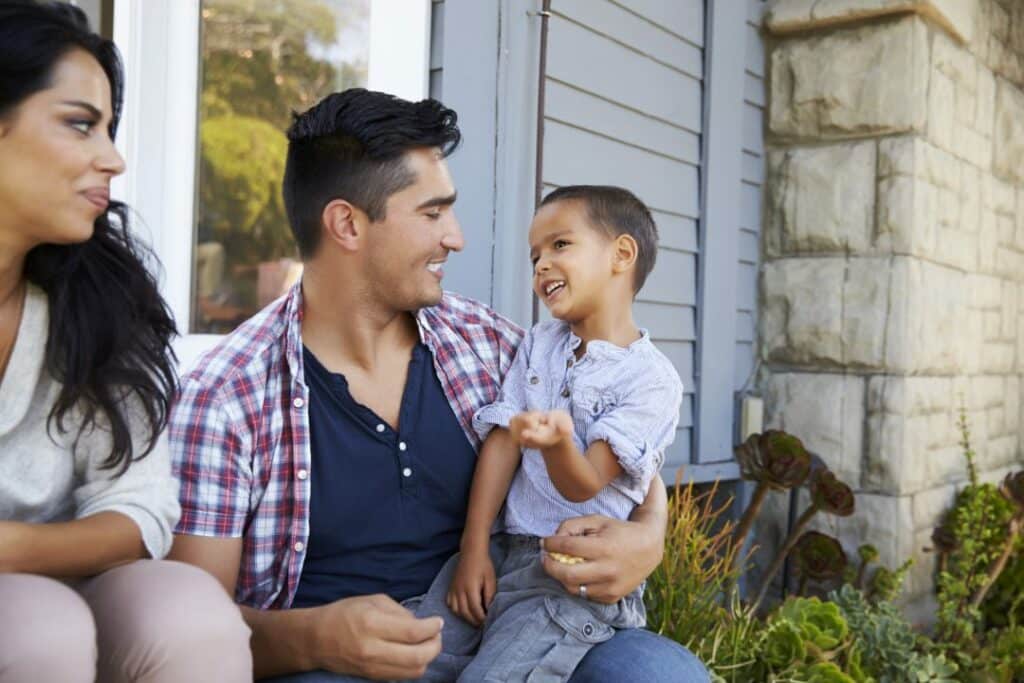Do you ever think parenting would be so much easier if you could just get your co-parent to follow your lead, or maybe even just do exactly what you tell them to? And also agree with you and back you up and not question you? It sounds positively idyllic!
And highly unlikely.
Before we have kids, we love to judge other people’s parenting. We just think we know it all, don’t we? We have firm ideas about what’s right and wrong, about what parents and children should or shouldn’t do and about the excellent parents we’re going to be when the time comes.
But, when the time does come, we realise something devastating: there is no clearly defined right or wrong way to parent. There are so many variables that impact parenting, not least of all the type of kid you end up with. And, most parents actually have no idea whether they’re doing the right thing or not! They’re just doing the best they can with what they know, and trying to learn, adapt and be responsive to the context and the child. Essentially, we’re all fumbling blindly along in the dark, hoping if we flail around enough we might hit a light switch at some point. Don’t tell.
And, as if parenting isn’t hard enough, a lot of us have to try and work out how to do it with someone else. Which is not to say single parenting is easier, not by a long shot. But, one factor is eliminated when you’re flying solo, and that’s the complicated messiness of trying to reconcile two sets of beliefs, opinions and values that a dual-parent arrangement brings.
When we parent, we’re helping to shape people. It’s a high stakes game, and that means we care, often a LOT, about how we do it. But, what happens when both parents care a whole lot but just can’t agree on the ‘how’?
WATCH: Parenting on the same page as your partner, with Dr Justin Coulson
‘The number one question I get asked by parents is: How can I parent on the same page as my partner?’ says ParentTV expert, Dr Justin Coulson.
‘In many families, there’s a conflict because one parent tends to be a little softer and the other is a bit firmer. Or, it might be that parents disagree about priorities or goals or boundaries. It’s important to understand from the outset that there may not be a way to be perfectly aligned as parents, but there are definitely things parents can do to work together more effectively.’
DR JUSTIN COULSON
This is echoed by ParentTV experts (and real-life couple!) Dr Vanessa Lapointe and David Loyst, who say that parents can’t enter into these conversations expecting that they should be able to just change their partner’s stance, opinions or beliefs about what they’re doing. ‘When people ask how to get their partner to behave in certain ways, I tell them that they can’t. They can only try to behave in certain ways, themselves,’ says David Loyst.
So, what can you do to build a little more consensus and harmony with your parenting partner? How do you cut out the noise and focus on finding a way forward (even if their ideas are backward)? Here’s what the experts say:
Having a shared vision
‘To parent on the same page means you actually need to step back from the parenting thing every now and then to have a conversation about what you both want for your family,’ says Dr Coulson. ‘Agreeing on this helps you to develop a shared vision and become aligned.’ So, when you get caught up in the small things, take a moment to consider the bigger picture. Chances are, you’ll both have similar outcomes in mind, like building a happy and healthy family life in which all members can thrive. Then, when you know what you want, you can make a plan for how to get there, Dr Coulson suggests. ‘We make plans for so many things in our lives, like holidays, education and finances. So, why not make a plan for your family, too?’ When you can agree on that overall vision, you’ll feel more united and invested in finding ways to move towards it.
Understanding the other parent’s perspective
Each of us comes to parenting with our own history. We might have baggage and hang-ups from how we were parented, or we might be trying to replicate the wonderful childhood we had, but in the current era. We might have ways of being and feelings that were nothing to do with the way we were parented, but instead are the results of certain experiences, events or interactions we’ve had. According to Vaness Lapointe, ‘we are all all of the ages we have ever been. So, when you enter into a new parent-child relationship as a parent, the familiarity of it can reawaken negative experiences and feelings from your own childhood. But, it’s not your grown-up self feeling those things, it’s the child within you.’ Unpacking and discussing where you’re coming from as a parent can help each of you understand why you feel the way you do. When you learn what’s shaped your partner, it’s easier to have empathy for them, and that’s a good foundation for productive communication.
Holding family meetings to discuss how you’re travelling
Have you ever had a family meeting? This can be a good way to check in with each family member and make sure you’re acting consistently with your partner and in collaboration with them. It also helps keep you on track and making progress towards that bigger vision we mentioned earlier. ‘When you have a family meeting, I suggest you just try and answer these three questions,’ says Dr Coulson. ‘1) What worked well in our family this week? 2) What hasn’t worked so well in our family this week? 3) What couple of things are we going to work on this week?’ These answers can inform your mutual parenting agenda.
Looking for the good in your partner
‘Your partner might really irritate you, but the chances are, they’re probably contributing to your family life and your childrens’ lives in positive ways,’ says Dr Coulson. ‘Choosing to see these things and making space for more of them helps you become more appreciative of your partner.’ Dr Lapointe confirms this, saying that instead of flying off the handle when they’re frustrating us, we need to work harder to see the needs that are propelling our partner’s actions. ‘See whatever it is behind your partner’s parenting behaviour, beyond their ego and bristly parts. Go there first, spend some time there and you might learn that they really want to do right by your child and they have a lot of fear about getting it wrong.’ The key to this is listening to them, Dr Lapointe continues. Like, REALLY listening to them.
‘We need to put some energy into making the other parent feel heard. We need to know what it is that’s making them want to continue on the path that they’re on. Then, we can come alongside that part of them and see the fear and worry that’s motivating them. You don’t have to do much more than that. Before long, they’ll be able to soften and become a bit more flexible.’
DR VANESSA LAPOINTE
And vice versa, for when they truly listen to you.
Of course, if you believe that the way your partner is parenting is actually damaging to your children, physically or mentally, it could be a good idea to seek professional help. Safety comes first and no parenting opinion or belief is justification for overriding this imperative.
Check out some more insight from our experts in these videos:





